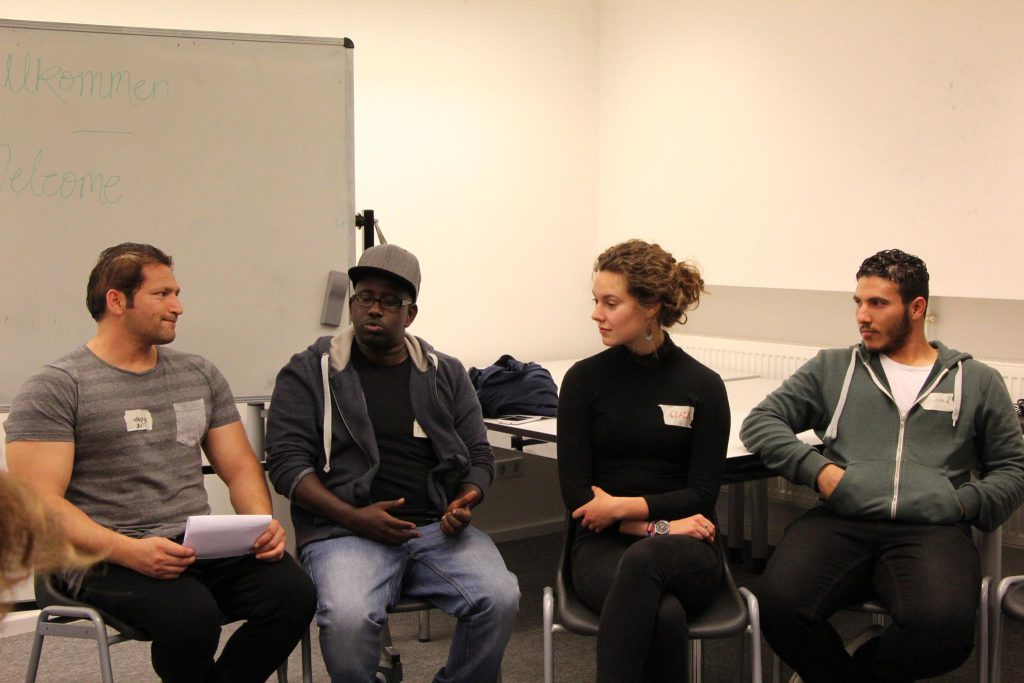
(credit: Tamar Maare)
Over the past couple of months, students of Bard College Berlin have been instrumental in setting up an ongoing program for the mutual cultural exchange and language development process between refugees, students, teachers and anyone from the neighborhood or Berlin community at large who might want to drop by. This program, Campus Conversations, is currently run by Bono Siebelink (BA2 HAST), Clara Holder (BA1 HAST) and Kerstin Weil (BA1 EPST) on the Bard College Berlin campus and is overseen by our Admissions and Recruitment Officer and Civic Engagement Coordinator, Xenia Muth. The current focus of the program is on German language learning, but it has the potential for much more than just that. As their page on the BCB website outlines, “we plan on diversifying the types of lessons offered as more people become involved.”
The program was inspired by Marta Vucovik’s (BA2 EPST) program BCB Open Campus against Closed Borders, started in the Fall semester of 2015. The initial aim of the project was to welcome refugees, migrants and asylum seekers to the campus to allow them to make use of the community and resources we have to offer. Because of their success and with Marta’s permission, the BCB Civic Engagement Initiative decided to continue offering the meetings when Marta and other student volunteers left for summer break. The Civic Engagement Student Assistant at the time, Bono Sieblink, took over the organisation of this program along with Hanah Khalaf (BA3 HAST) and Marga Hattingh (BA2 EPST). The name was changed to Campus Conversations so as to remain respectful to Marta’s project.
In Spring 2016 BCB noticed a grant offer by DAAD that aimed to fund projects introducing refugees to university life. BCB and some other German universities received sponsoring for additional student jobs for Campus Conversations. Thanks to this funding and the dedication of the students involved, the project has been a great success. Initially, Bono says, it was hard to spread the word. They visited multiple refugee shelters in Pankow and worked closely with them to advertise the idea. Soon enough, though, the project began to gain momentum.
Campus Conversations runs very smoothly: each week before the actual Conversations begin, Kerstin, Clara and Bono meet to discuss and decide an umbrella theme for the Thursday German language learning sessions. After deciding on a theme, they come up with an appropriate vocabulary list, draw up a few questions and, on occasion, make a quick powerpoint for their selected theme. Thanks to their preparation before the time, Clara says that they’re very efficient in the two hours that they have for Campus Conversations on Thursday evenings. They begin with small discussions between everyone and slowly transition into covering their selected theme. Some themes they covered so far have been die Farbe (colours), die Stadtleben (city life), and Reisen (travelling). Clara says that she hopes to expand the project so it uses different mediums for German language exploration. The group has so far watched the German film Shwarzfahrer and has even colluded with BCB’s debate club president, Templeton Kay, to conduct a Model-UN style simulation for the participants. She suggests watching more films and perhaps even having a guest speaker or two.
All three of them agree that directing the Campus Conversations is not always easy. Not everyone who participates has the same level of German, which sometimes makes the German conversation a little tricky. Bono says that the best way to deal with that barrier is to go with the flow rather than to stick to a rigid plan of how to execute a session. Their conversations often depend on the mood and atmosphere of the room and, most importantly, the enthusiasm of the people in it. Bono recalls a session on die Farbe: “We asked them to draw whatever they wanted, and one particular man drew a lovely landscape. He used to be in prison and he said this is something he drew every day there. It kept him calm.” Emotions like this are often brought out during the sessions that shape not only future conversations, but the relationship between the participants.
One of the greatest successes of this program is the liquidity with which language exchange is handled, especially when not all participants are fluent or confident. Meeting new people is also a plus. It’s a way to get to know someone that you might never run into on the street or have the chance to meet otherwise. Language has the remarkable ability to adapt to the atmosphere in which it’s being spoken. It goes slow for those who need it to and fast for the others. Campus Conversations represents a spirit much larger than that of a single scholarship program: this is unification. The unity is present in how inclusive and accommodating the program has become and how it has transcended spaces of race, religion, gender, age and — most obviously but importantly — language. It provides you with a different perspective, says Kerstin.
This accommodation for people with vastly different histories and lives has quite a large effect on both the participants and the students running it. As globalization becomes more of a reality, so does the importance of assimilation. Campus Conversations is a perfect example of a program that brings people together on a flexible, multifaceted platform. All the participants have an equal opportunity to share their histories and their cultures while also learning about new lives and experiences!
Amongst all the chaos and turmoil we face today, it is vital that we are on the lookout to spot small gems like this and support them in any way that we can. Let us all — students, teachers, neighbours, and refugees alike — give back to the global cause of humanity and shoulder a level of responsibility for it. Let us all join in on the conversation.
For more information about the weekly BCB Campus Conversations and how you can join in, please visit http://www.berlin.bard.edu/academics/civic-engagement/bcb-campus-conversations/
[hupso_hide]
